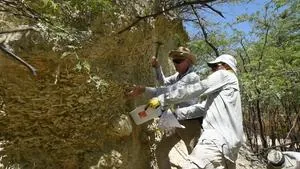
7,000-Year-Old Fossils Unveil Shocking Changes in Caribbean Reef Ecosystems
2025-06-30
Author: Michael
Fossils often conjure visions of colossal dinosaurs, but the true treasure lies in the remnants of smaller organisms, like fish and corals, which provide invaluable insights into our oceans’ history.
Researchers at the Smithsonian Tropical Research Institute (STRI) have made a groundbreaking discovery while studying ancient, fossilized coral reefs in Panama's Bocas del Toro Province and the Dominican Republic. These well-preserved reefs, dating back 7,000 years, offer an extraordinary glimpse into the Caribbean before human interference, revealing a dramatically altered underwater ecosystem.
During their investigation, scientists unearthed thousands of fish ear bones and shark scales trapped within the sediments, allowing them to reconstruct the thriving marine communities of the past. Their findings tell a shocking story: shark populations have plummeted by a staggering 75%, while predatory fish targeted by humans have shrunk by 22%. Strikingly, however, the prey fish—those consumed by sharks and other predators—have doubled in number and increased in size by 17% in modern reefs. This phenomenon is the first concrete evidence of the "predator release effect," a concept long hypothesized but rarely documented due to the lack of comparative historical data.
Remarkably, the smallest reef fish that find shelter in coral crevices displayed no change in either size or abundance over millennia, indicating a surprising resilience amid the shifting dynamics of higher trophic levels.
To bridge the gap between ancient and contemporary ecosystems, scientists meticulously collected and analyzed over 800 dermal denticles—the sandpapery scales of sharks—and 5,724 otoliths, the tiny ear bones that reveal critical information about fish growth and lifespan.
Furthermore, the research included measuring damselfish bite marks on coral branches from both fossilized and modern reefs. This analysis indicated that bite frequency has surged in present-day reefs, correlating with the increased populations of prey fish.
These findings highlight a major shift in modern Caribbean reef food webs: fewer sharks and predatory fish mean prey populations have expanded unchecked, resulting in larger and more abundant prey species. In contrast, the resilient small reef-sheltered fish defy these trends, maintaining their status over thousands of years, suggesting that deteriorating water quality and habitat degradation haven't significantly influenced their community structure.
This transformative study emphasizes the fossil record’s potential for future conservation efforts. By unveiling the pristine state of coral reefs prior to intensive human fishing, these ancient fossils offer a crucial baseline for understanding the historical food webs, illuminating what has changed—and what has endured—in our fragile marine ecosystems.
The results of this collaborative research, published in the Proceedings of the National Academy of Sciences (PNAS), involve contributions from STRI, the Sistema Nacional de Investigación (SENACYT) in Panama, the Marine Science Institute at the University of Texas at Austin, and several other esteemed institutions across the globe.









 Brasil (PT)
Brasil (PT)
 Canada (EN)
Canada (EN)
 Chile (ES)
Chile (ES)
 Česko (CS)
Česko (CS)
 대한민국 (KO)
대한민국 (KO)
 España (ES)
España (ES)
 France (FR)
France (FR)
 Hong Kong (EN)
Hong Kong (EN)
 Italia (IT)
Italia (IT)
 日本 (JA)
日本 (JA)
 Magyarország (HU)
Magyarország (HU)
 Norge (NO)
Norge (NO)
 Polska (PL)
Polska (PL)
 Schweiz (DE)
Schweiz (DE)
 Singapore (EN)
Singapore (EN)
 Sverige (SV)
Sverige (SV)
 Suomi (FI)
Suomi (FI)
 Türkiye (TR)
Türkiye (TR)
 الإمارات العربية المتحدة (AR)
الإمارات العربية المتحدة (AR)